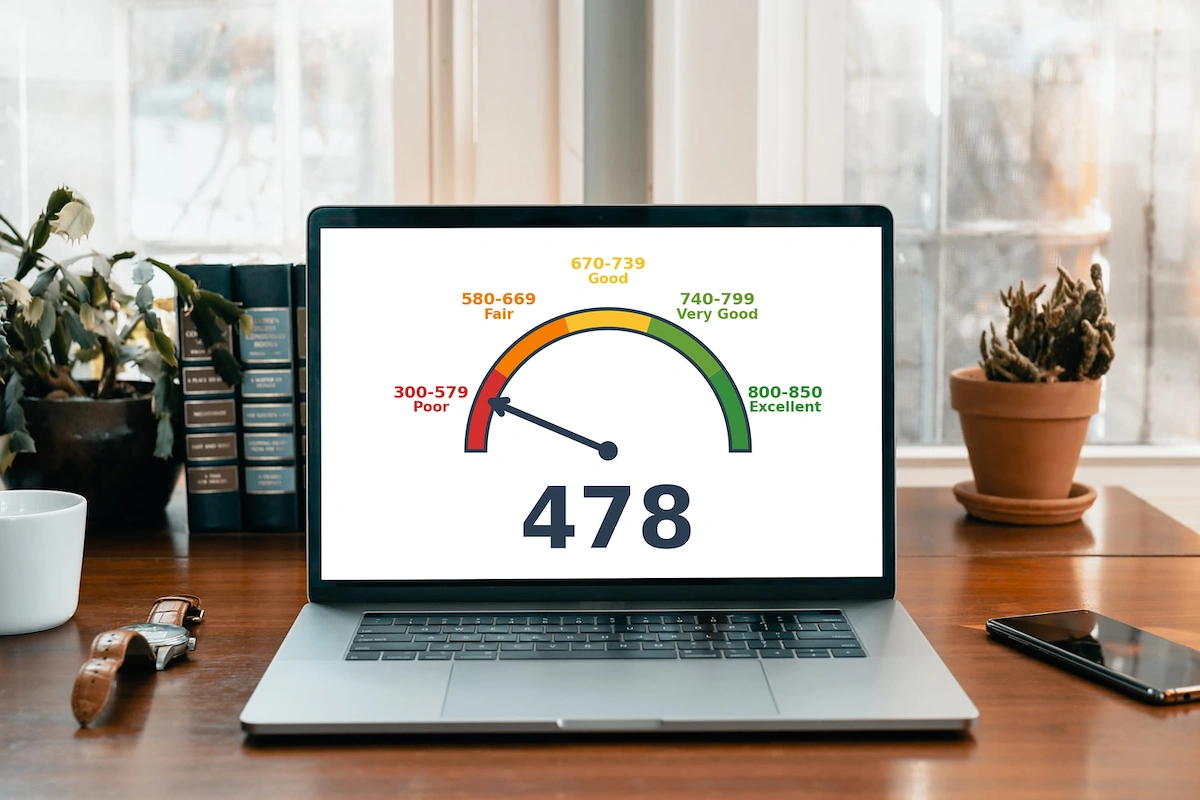
Kudos has partnered with CardRatings and Red Ventures for our coverage of credit card products. Kudos, CardRatings, and Red Ventures may receive a commission from card issuers. Kudos may receive commission from card issuers. Some of the card offers that appear on Kudos are from advertisers and may impact how and where card products appear on the site. Kudos tries to include as many card companies and offers as we are aware of, including offers from issuers that don't pay us, but we may not cover all card companies or all available card offers. You don't have to use our links, but we're grateful when you do!
478 Credit score: What You Need to Know in 2026
July 1, 2025


TL;DR
A 478 credit score presents some financial hurdles, but it provides a clear starting point for building a stronger credit profile. This score falls into the "Poor" FICO score category, which means there's a significant opportunity to improve your financial standing.
What Does a 478 Credit Score Mean?
A credit score of 478 falls squarely into the 'poor' range on the FICO model, which spans from 300 to 850. Lenders view this score as a sign of high risk, making it difficult to qualify for credit cards, auto loans, or mortgages. If you are approved, you’ll likely face steep interest rates and unfavorable terms, which increases the overall cost of borrowing.
While a 478 score presents significant financial obstacles, it’s not a permanent state. Your score is a snapshot of your credit history, but it doesn't have to define your future. Understanding the factors that led to this score is the first step toward building a stronger credit profile and improving your financial outlook over time.
Who Has a 478 Credit Score?
Credit scores generally improve with age, as individuals have more time to build a positive payment history and a longer credit file. According to 2023 data from Experian, the average FICO score breaks down by age group as follows:
- Ages 18-26 (Generation Z): 680
- Ages 27-42 (Millennials): 690
- Ages 43-58 (Generation X): 709
- Ages 59-77 (Baby Boomers): 745
- Ages 78+ (Silent Generation): 760
Credit Cards With a 478 Credit Score
A credit score of 478 falls into the "poor" range, which can significantly hinder your ability to qualify for most traditional credit cards. Lenders view this score as an indicator of high risk, making them hesitant to extend unsecured credit due to concerns about potential defaults. Consequently, your options will likely be restricted to products specifically designed for bad credit, such as secured credit cards or unsecured cards with high annual fees and interest rates.
To navigate these limited options, AI-powered tools from Kudos like Dream Wallet analyze your unique spending habits to find suitable cards from a database of nearly 3,000 options. The platform also provides insights into how applying for a new card may affect your credit, helping you make an informed decision that aligns with your financial situation.
Auto Loans and a 478 Credit Score
A 478 credit score places you in the deep subprime bracket, which can make securing an auto loan challenging. While lenders may still approve your application, you should expect to be offered significantly higher interest rates according to a 2025 analysis.
- Super-prime (781-850): 5.25% for new cars and 7.13% for used cars
- Prime (661-780): 6.87% for new cars and 9.36% for used cars
- Non-prime (601-660): 9.83% for new cars and 13.92% for used cars
- Subprime (501-600): 13.18% for new cars and 18.86% for used cars
- Deep subprime (300-500): 15.77% for new cars and 21.55% for used cars
Mortgages at a 478 Credit Score
With a 478 credit score, your mortgage options are extremely limited, and you will not qualify for a conventional loan. Your most viable path is likely an FHA-insured loan, which can accept scores as low as 500. However, because your score falls below the 580 threshold, you will be required to provide a down payment of at least 10% of the home's purchase price. Other specialty lenders are rare and come with even stricter requirements.
Beyond the high down payment, a low score significantly impacts your loan terms. You can expect much higher interest rates, costlier mortgage insurance premiums, and a lower borrowing limit, which restricts the price of homes you can afford. Lenders will also subject your application to manual underwriting, which involves a much more rigorous review of your income, debts, and overall financial stability before any potential approval.
What's in a Credit Score?
Figuring out what goes into your credit score can feel like trying to solve a complex puzzle, but it generally boils down to a handful of key elements. The most common factors include:
- Your history of making payments on time is the most significant factor.
- How much of your available credit you're currently using, known as your credit utilization ratio, plays a major role.
- The age of your credit accounts, including the average age and the age of your oldest account, is also considered.
- Lenders like to see that you can responsibly manage different types of credit, such as credit cards and loans.
- Opening several new credit accounts in a short period can be seen as a risk and may temporarily lower your score.
How to Improve Your 478 Credit Score
Don't be discouraged by a 478 credit score; it is entirely possible to improve it with consistent, positive financial habits. With a focused strategy, most people can see meaningful changes to their score within three to six months.
- Establish automatic bill payments. Payment history is the most significant factor in your credit score, so making on-time payments is the most important step you can take. Setting up automatic payments is a simple way to ensure you never miss a due date and begin building a positive history.
- Reduce your credit utilization ratio. This ratio is the amount of credit you're using compared to your total available credit, and you should aim to keep it below 30%. Paying down balances is crucial when your score is low, as it shows lenders you can manage debt responsibly.
- Apply for a secured credit card. A secured card requires a cash deposit as collateral, which makes it easier to get approved for when you are trying to build or rebuild your credit. Responsible use and on-time payments are reported to the credit bureaus, directly helping your score improve over time.
- Monitor your credit reports regularly. Errors on your credit report can unfairly drag your score down, and you have the right to dispute them. You can get free reports from Experian, TransUnion, and Equifax to check for inaccuracies that might be holding you back.
The free Kudos browser extension can help you manage your cards and make smarter financial decisions as you work to improve your credit score.
Unlock your extra benefits when you become a Kudos member

Turn your online shopping into even more rewards

Join over 400,000 members simplifying their finances

Editorial Disclosure: Opinions expressed here are those of Kudos alone, not those of any bank, credit card issuer, hotel, airline, or other entity. This content has not been reviewed, approved or otherwise endorsed by any of the entities included within the post.



































.webp)







